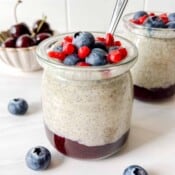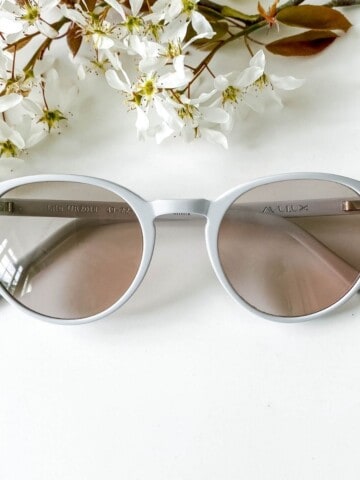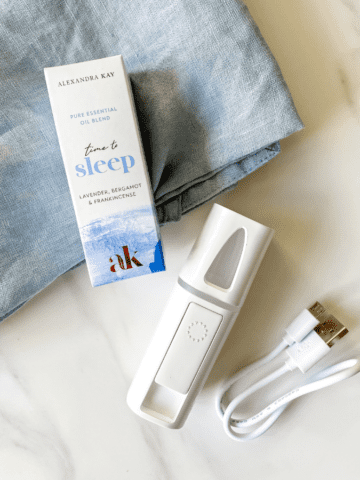I still remember the first time that going into a store really bothered me. It was a small pharmacy, and I sat waiting for my prescription scrolling on my phone. Then I looked up and my vision went all over the place, my head was dizzy and I felt a little nauseous. Why? Because rows upon rows of medicine bottles made my vestibular migraine symptoms spin out of control (pun intended!).
After that day I noticed more and more that clutter bothered me, even though I don't have a cluttered house, if that makes sense. But I do have 'stuff', as we all do. Having become rather more organised I have come to see how much de-cluttering with chronic illness helps with my symptoms. Hope you find this helpful!

Jump to:
Reduces stress
The number one way that de-cluttering helps me with chronic illness symptoms is by reducing stress. Personally I find a lot of clutter to be overwhelming. It feels out of control, and that makes me feel out of control. When I haven't had a good tidy-up for a while I feel stress levels rising, which definitely isn't good for chronic illness conditions.
Saves time and energy
When energy is low the last thing I want to do is spend a long time searching for a particular piece of paper, or even my medications amongst a ton of other things. It's quicker and easier to have a place for everything and not have to worry about losing something. Also great if you live with brain fog - having a place for something will help you immensely!
Also on saving time and energy, with less clutter there is less to clean. And that sounds good to me! I would much rather spend my energy on activities I enjoy and not vacuuming or dusting lots of little knick-knacks on my bookshelves.
May help with particular conditions
Of course, not everyone has vestibular migraine as I do, but I know many people with migraine and fibromyalgia that I have spoken to on my Instagram find that a lot of clutter can be visually hard to live with. It can cause a dizzy feeling, or even feeling nauseous. A more low-key or minimal living space may be helpful.
I also find that with MCAS (mast cell activation syndrome) less clutter means less dust, and less dust means fewer reactions. As I have a dust mite allergy keeping things clean is definitely really helpful for my health.

How to start de-cluttering with chronic illness
So, if de-cluttering with chronic illness is helpful, how can we go about it? A huge overhaul is likely going to be overwhelming and simply use up too many of our precious spoons, and maybe even cause a flare-up of symptoms.
Marie Kondo famously says that we should only hold on to items that 'spark joy' in her book The Life-Changing Magic of Tidying Up. Her approach is to focus on the things that you love, and have the space for those.
I totally agree that it is lovely to have possessions that spark joy. I have favourite clothes, books and even a mug that I bought in a sale for less than a dollar that I love to have my coffee in. Of course though, some items are necessary but not 'joyful'. I'm thinking my medication pots, cleaning products and the ratty old toy my cat loves. I guess it sparks joy for him . . .
Tips for de-cluttering with chronic illness
1. Make a list of tasks and then break down into smaller areas
I'm one of those people who wants to do something in a day. Or a few hours even, if possible. Does this work with chronic illness? Nope, of course not.
When living with chronic illness it seems far more sensible and achievable to make a list of tasks and then break them down. That way you can just do little bits at a time without overwhelming your mind or body.
Take clothes, as I have quite a lot of them . . . Doing a complete overhaul in a day is far too much. So start with a drawer, or half a drawer one day, and then perhaps another drawer a few days later.
Using assistive devices such as a 'grabber' could also be very helpful.
2. Have trash bags for items to gift, donate and throw away
I always find it easier to know what I am doing with the things I'm removing from my home when de-cluttering. So I do the three bag method - one for things friends or family may want, another for donating to charity and another for those items that are long past their best or broken and just need to be thrown away.
3. Start with a few minutes a day
As with making a list of smaller tasks, only try and spend small amounts of time on de-cluttering. It's easy to push yourself too much and then end up either with higher symptoms or feeling defeated by it, or both.
A few minutes a day, or however long is achievable for you, over a few weeks really adds up, so don't feel bad that you aren't doing it for longer.

4. Tidy as you go
The best way I find to de-clutter is to tidy as you go. Often easier said than done, but it makes life so much easier! I really try and deal with anything that is broken, past its best or that I know I won't use again fairly quickly. Otherwise it just lingers around waiting for me to do something.
During the day too, I find that tidying as I go makes me feel less fatigued. When I'm cooking I try and put plates in the dishwasher as I use them, or throw out empty food containers, rather than doing it after I've eaten when I just want to sit on the couch.
5. Use baskets, tubs, or folders for storage
Who doesn't love a bit of storage? No? Just me? I find things having their own 'place' to be so helpful and stops me 1) having to search for things; and 2) things just lying around collecting dust (that will make me sneeze).
Take medical letters - I have (many!) folders where I file them per condition. That way I can quickly grab them when I am going to a medical appointment or need to consult them for myself. So much less stressful than trying to find a particular piece of paper amongst a whole pile of them.
This is also helpful if you are de-cluttering items for taking care of plants - whether indoors or in a greenhouse. Maybe use a tub for packets of seeds to use next year, or string, ties and other little things that easily get lost!
6. Grab a helper!
One of the best tips I think! Rope in a friend or family member to help you out. It will save on energy for you and they can also give helpful feedback for whether you really want to keep or throw out particular items.
7. Check use-by dates
Any time you are cooking, have a quick check of your pantry staples for their use-by dates. I recently reached for some baking powder that was nearly a year out. Over time you will slowly de-clutter your pantry and actually know what is usable! I think we all have a few suspect jars or cartons at the back of the cupboards . . .
I'm active on Instagram, Facebook and Pinterest if you would like to follow along!
Don't forget to pin the post!

Please follow the advice of your doctor as to all medical treatments, supplements and dietary choices, as set out in my disclaimer. I am not a medical professional, and this post, as well as all other posts on this blog, are for informational purposes only.

















Katie Clark says
I HATE it when things are cluttered. My family isn't always happy when I go through and clear out things. I've always tied it to the chaotic home I lived in as a child. I can't think straight until I have things in their place. Now that I'm retired, I'm simplifying my wardrobe, keeping only things that I truly LOVE:)
throughthefibrofog says
I"m the same - it just stresses me out when there is clutter. I always think that if you remove the things you aren't fussed about you have more space for the things that you love - as you say! 🙂
Shruti Chopra says
I do have quite a clutter OCD. Everything needs to be organised otherwise it plays on my sleep! But I think I struggle with one of the points you've mentioned and that's to do it a few minutes a day - I kind-of get into that zone and definitely over-do it. I should pace myself better so that's such an important reminder. 🙂
throughthefibrofog says
Oh I'm the same Shruti - I swear I sleep better when my bedroom especially is all nice and tidy. I have a little pile of papers at the moment and it's playing on my mind. In fact, maybe I'll sort that out now . . .
Shruti Chopra says
So did you manage to get through those papers? 😀
throughthefibrofog says
I did! All organised and so there isn't a little pile any more. Seems I was holding on to things that were entirely useless!
the joyous living says
great list of ideas, claire. i especially like the idea of using trash bags. just binning it can be so therapeutic 😉
throughthefibrofog says
I find having a de-clutter so therapuetic! Somehow so relaxing (when it's all done!)
Alison says
Claire, Thanks for this! I *know* many of these suggestions, but I've been horrible at actually *doing* them! I really appreciate the reminder! I have two cats and mild cat allergies, so I really need to stay on top of this stuff... The breaking down tasks is so very important and so very hard to keep doing! I also just want things done, so my partner and I go through the occasional cleaning spree, and then spend a day or two recovering.(he has an autoimmune disorder and chronic pain himself). I actually have 'spend 10 minutes tidying up' on my daily habits list, but I haven't been following through on that lately! This post is encouraging me to get back into that habit! Thank you!
throughthefibrofog says
So glad the reminder is helpful! I also have a cat and a mild cat allergy so I need to hoover - especially when it gets warmer and he is shedding. I like the idea of doing ten minutes a day - that's a good option too.
Sheryl says
Couldn't agree more, Claire. Clutter makes me feel stressed and overwhelmed, too. And thanks for the tips on how to clear it up bit by bit! I can get a bit frustrated decluttering when I could be 'spending the time doing something more worthwhile' haha. Not very patient as you can tell 😉